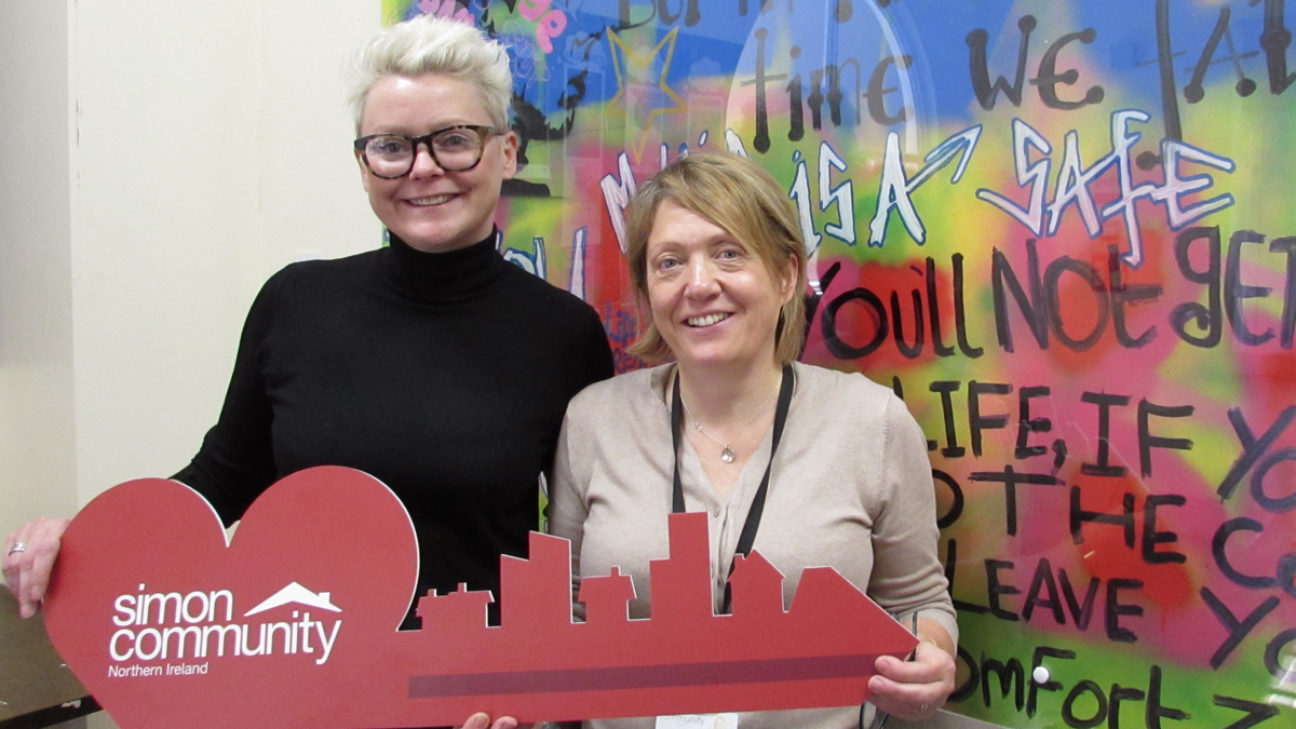
Karen McAlister, Head of Research and Development and Wilma Henderson, Service Manager at the Foyer.
But there's still work to be done, say those working in the sector.
Frontline staff who work with people experiencing homelessness have been praised for preventing a homelessness health crisis in Northern Ireland.
While most of us have spent the last year and a half locked down in our homes, the Simon Community is among a number of organisations who have worked to support those with no home to go to.
When the first lockdown hit in March 2020, organisations across the homelessness sector banded together to get everyone off the streets of Belfast.
It was the first time no one was living rough on the streets of Belfast in at least 10 years.
Karen McAlister, head of research and development with the Simon Community, said their biggest success during the coronavirus pandemic was diverting a homelessness health crisis.
She said:
Across the board, workers in homelessness and housing organisations and their colleagues in the PHA avoided a health crisis in homelessness services. We have done really good innovative work, but also we didn’t stand anything down, we kept services running.
We worked alongside PHA government guidelines but, we still supported over 600 people every single day. So that, for me, has to be a celebration in relation to our workforce during covid.
In February 2020, over 20,000 people were registered as homeless in Northern Ireland. Under Housing Executive rules, this included people who were sleeping on the streets, as well as those living in overcrowded conditions, with friends or family, or in temporary accommodation such as a hostel or B&B.
Karen said there is still a lack of education around what it means to be homeless.
Homelessness is far reaching, it affects different ages, different sexes, and it’s not just about people on the street.
If you ask the public what homelessness looks like people will maybe refer to a homeless person on the street and actually quite often what we’re seeing is we have hidden homeless populations.
More importantly, Karen believes the pandemic has opened people’s eyes to understanding the vulnerability that comes with experiencing homelessness.
It’s not just about education, it’s about understanding, it’s about compassion, it’s about going the extra mile.
she added,
If there’s one thing that came out of the pandemic that was so important, was a home. Your home became your office, your school, your place to hang out.
I think from a societal perspective, it probably connected people more to the vulnerability that everybody is in, in relation to that pathway. I think during this year, many of us have experienced potential housing vulnerability or homes that are vulnerable to social factors, psychological factors, financial factors, so maybe that gives us a little bit more understanding of people’s journeys.
The Simon Community works with a wide range of clients across Northern Ireland, but over the pandemic they have seen a rise in some groups.
Karen explained:
Youth homelessness has been on the rise for several years and what we did see is that during the pandemic, and the housing executive statistics will report this, is a spike in youth homelessness.
The organisation has launched a new initiative called ‘Housing First for Youth’.
The service works to prevent young people from declaring homelessness. It gives those who are at a high risk of homelessness the opportunity to get a home and support rather than spend time in temporary accommodation.
Karen said,
Homeless prevention is really significant for us. It’s not a one size fits all. Young people aren’t just one homogenous group. They come with a range of different issues. What Simon Community have done is listen to young people, had conversations with young people, and develop a range of bespoke services to meet those needs.
The service is launching with the Belfast and South-Eastern Health and Social Care Trusts after a successful three and a half year run with the Northern Trust.
Karen said.
If we understood more, maybe we all could do a bit better.
Imagine at 18, living in a homeless hostel, having to get up and put your school uniform on, and going to school. If people saw that aspect of homelessness, I think it would change.
Nobody should be homeless at 18. It’s a time of adventure and risk taking and making mistakes and all those kinds of things, but if you think about young people, the consequences, if you’re homeless of making a mistake, or doing something silly could mean your placement could break down.
The young people that we support, we stand beside every day, haven’t had it easy but actually are the most creative, innovative, talented young people that I have ever met. And for me we just want to make sure that they get the best deal. That they have a future and life chances the same as any other young person.
For more information on Simon Community's services visit simoncommunity.org.
Interested in a career that's more then your typical 9-5? Click Here.
Article first published by Belfast Live 9th July, written by Amy Murray.